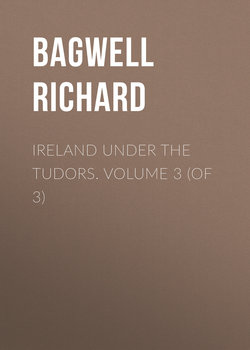Ireland under the Tudors. Volume 3 (of 3)

Реклама. ООО «ЛитРес», ИНН: 7719571260.
Оглавление
Bagwell Richard. Ireland under the Tudors. Volume 3 (of 3)
PREFACE TO THE THIRD VOLUME
CHAPTER XXXVI. REBELLION OF JAMES FITZMAURICE, 1579
CHAPTER XXXVII. THE DESMOND REBELLION, 1579-1580
CHAPTER XXXVIII. THE DESMOND WAR – SECOND STAGE, 1580-1581
CHAPTER XXXIX. THE DESMOND WAR – FINAL STAGE, 1581-1583
CHAPTER XL. GOVERNMENT OF PERROTT, 1583-1584
CHAPTER XLI. GOVERNMENT OF PERROTT, 1585-1588
CHAPTER XLII. THE INVINCIBLE ARMADA
CHAPTER XLIII. ADMINISTRATION OF FITZWILLIAM, 1588-1594
CHAPTER XLIV. ADMINISTRATION OF FITZWILLIAM, 1592-1594
CHAPTER XLV. GOVERNMENT OF RUSSELL, 1594-1597
CHAPTER XLVI. GOVERNMENT OF LORD BURGH, 1597
CHAPTER XLVII. GENERAL RISING UNDER TYRONE, 1598-1599
CHAPTER XLVIII. ESSEX IN IRELAND, 1599
CHAPTER XLIX. GOVERNMENT OF MOUNTJOY, 1600
CHAPTER L. GOVERNMENT OF MOUNTJOY, 1601
CHAPTER LI. THE SPANIARDS IN MUNSTER, 1601-1602
CHAPTER LII. THE END OF THE REIGN, 1602-1603
CHAPTER LIII. ELIZABETHAN IRELAND
CHAPTER LIV. THE CHURCH
Отрывок из книги
Sidney’s departure had been partly delayed by a report that Stukeley’s long-threatened invasion was at last coming. The adventurer had been knighted in Spain, and Philip had said something about the Duchy of Leinster. The Duke of Feria and his party were willing to make him Duke of Ireland, and he seems to have taken that title. At Paris Walsingham remonstrated with Olivares, who carelessly, and no doubt falsely, replied that he had never heard of Stukeley, but that the king habitually honoured those who offered him service. Walsingham knew no Spanish, and Olivares would speak nothing else, so that the conversation could scarcely have serious results. But the remonstrances of Archbishop Fitzgibbon and other genuine Irish refugees gradually told upon Philip, and the means of living luxuriously and making a show were withheld. ‘The practices of Stukeley,’ wrote Burghley to Walsingham, ‘are abated in Spain by discovery of his lewdness and insufficiency;’ and he went to Rome, where the Countess of Northumberland had secured him a good reception. ‘He left Florida kingdom,’ said Fitzwilliam sarcastically, ‘only for holiness’ sake, and to have a red hat;’ adding that he was thought holy at Waterford for going barefooted about streets and churches. ‘It is incredible,’ says Fuller, ‘how quickly he wrought himself through the notice into the favour, through the court into the chamber, yea, closet and bosom, of Pope Pius Quintus.’ An able seaman, Stukeley was in some degree fitted to advance the Pontiff’s darling plan for crushing the Turks. The old pirate did find his way to Don John of Austria’s fleet, and seems to have been present at Lepanto. His prowess in the Levant restored him to Philip’s favour, and he was soon again in Spain, in company with a Doria and in receipt of 1,000 ducats a week.1
James Fitzmaurice was already at Rome. He had spent the best part of two years in France, where he was well entertained, but where he found no real help. He received supplies of money occasionally. The Parisians daily addressed him as King of Ireland, but nothing was done towards the realisation of the title. Sir William Drury’s secret agent was in communication with one of Fitzmaurice’s most trusted companions, and his hopes and fears were well known in Ireland. At one time he was sure of 1,200 Frenchmen, at another he was likely to get 4,000; and De la Roche, who was no stranger in Munster, was to have at least six tall ships for transport. De la Roche did nothing but convey the exile’s eldest son, Maurice, to Portugal, where he entered the University of Coimbra. Sir Amyas Paulet had instructions to remonstrate with the French Court, and the old Puritan seems to have been quite a match for Catherine de Medici; but there was little sincerity on either side. The Queen-mother’s confidential agent confessed that all was in disorder, and that the French harbours were full of pirates and thieves, but she herself told Paulet that De la Roche had strict orders to attempt nothing against England. Having little hope of France, Fitzmaurice himself went to Spain, where his reception was equally barren of result. The Catholic King was perhaps offended at the Most Christian King having been first applied to, and at all events he was not yet anxious to break openly with his sister-in-law.3
.....
The whole document is a good example of the sanguine rhetoric in which exiles have always indulged, and of the way in which the leaders of Irish sedition have been accustomed to talk. The part assigned to continental powers and to English Catholics in the sixteenth century, was transferred to the French monarchy in the seventeenth, and to the revolutionary republic in the eighteenth; and now, in the nineteenth, it is given to the United States of America, and to the British working-man.
A translation of the shorter paper may well be given in full: – ‘A just war requires three conditions – a just cause, lawful power, and the means of carrying on lawful war. It shall be made clear that all three conditions are fulfilled in the present case.
.....